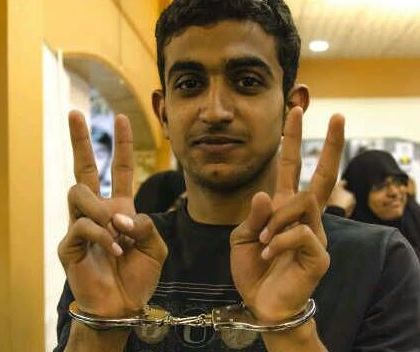The Bahrain Center for Human Rights expresses serious concern in regards to the practice by the Public Prosecution in Bahrain in bringing new charges against detainees to avoid releasing them. In the most recent case, Mansoor AlJamri, 19 years old, had a new case brought against him yesterday, and according to information relayed to the BCHR by the family, the Public Prosecution ordered that he be detained for 60 days pending investigation under the internationally criticized Terrorism Law.
Mansoor AlJamri was arrested on the 9th of January 2014 along with Ahmed AlArab and Hussain AlGhasrah after a dawn house raid at the home of AlGhasrah in Hamad Town. AlJamri had been in hiding since his release from prison in Sep 2012. During his previous arrest in April 2012, AlJamri was reportedly subjected to beatings and torture, after which he was sentenced to 6 months in prison. Despite his young age, AlJamri was unable to graduate high school due to fear of getting arrested again if he attended his classes. During the recent arrest, AlJamri was severely beaten and told to give information about the whereabouts of Ahmed AlArab. After AlArab was found in the same house as AlJamri during the raid, a police officer reportedly told AlJamri “Don’t think you will ever get out of jail. We found AlArab and you didn’t help. My gift to you will be to make sure you never get out of prison.”
After his arrest, AlJamri was at the CID for four days, where he was held incommunicado and reportedly tortured. Part of the torture he endured was severe beatings, deprivation of sleep, and he was not allowed to shower or pray. The charge brought against Aljamri was aiding a fugitive.
On the morning of Wednesday, 4th June 2014, prison guards went to Mansoor AlJamri at the Dry Docks prison and told him to go with them to the Public Prosecution. AlJamri had a hearing two days ago, but was not informed that the judge had issued a decision for his release. When AlJamri refused to go with them, they showed him a letter from the Public Prosecutor ordering them to bring him by force if he refuses to go. The policeman reportedly told AlJamri: “We have riot police waiting outside, if you don’t come with us now, I’ll call them in.” Knowing the consequences of having to deal with riot police, AlJamri went with them. During the entire ride to the public prosecution, AlJamri was handcuffed from behind, and he was forced to put his head between his knees. The handcuffs were tightened so that they left marks on his wrists, and the police sitting on both sides of him in the car leaned on his back causing him further pain.
At the Public Prosecution, AlJamri was not provided with a lawyer, and the prosecutor reportedly ridiculed AlJamri saying: “You think you will be released? We have a new case for you. You injured the left hip of a police officer.” AlJamri was told to “confess” to this charge, as well as to implicate other youth under the same charge. He was provided with names, and when AlJamri said he did not know any of them, or of any policeman with an injured hip, he was ridiculed again by the prosecutor who reiterated that AlJamri will not be released. AlJamri was then returned to the Dry Docks detention center after an order from the prosecutor to detain him for 60 days pending investigation under the internationally criticized Terrorism Law.
Mansoor AlJamri is not the first detainee who has had new charges brought against him to prevent his release. In one example, Mohammed Mirza Rabie, was ordered released by a judge, but new charges were brought against him to prevent his release. Each time one of his cases was sent to an appeal court, the judge dismissed the case, citing a lack of credible evidence. Every time his lawyer moved to have him released from detention, another charge was brought against him. In total, over eleven cases were brought up against Rabie. Younis and Sadiq Ashour were both arrested in September 2011 from Samaheej mosque. Every time there was a decision for their release they would be taken to the police station to be picked up by their parents, but then the parents would be informed that a new case has been brought against them and they will not be released.
The BCHR believes that this continued targeting of specific youth who, like Mansoor AlJamri, are bloggers, participate in protests and/or assist with documentation for local NGO’s, is a practice to punish them for practicing their basic rights. Creating new charges against detainees to prevent them from being released is a clear result of the culture of impunity that is implemented by the highest levels of government. The BCHR has documented numerous cases in which police officers tell victims that there is no law, and they will make sure the victims do not get out of prison. The implication of the Public Prosecution in human rights violations is especially concerning; showing the continued cooperation between the police and the Public Prosecution in the violations committed.
Based on the information provided above, the BCHR calls on the United States, the United Kingdom, the United Nations and all other close allies and relevant international institutions to pressure the Government of Bahrain to:
1. Immediately and unconditionally release Mansoor AlJamri and all other political prisoners in Bahrain, and drop all charges against them.
2. Immediately start a process of reforming the Judiciary.
3. Hold to account any and all officials, especially those in senior positions, who have participated in, ordered and/or overseen the practice of human rights violations.
4. Immediately start providing rehabilitation and reparations for all victims of torture.

